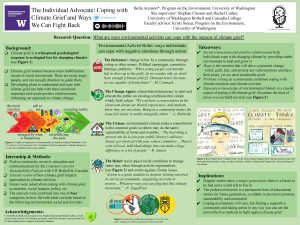THE INDIVIDUAL ADVOCATE: COPING WITH CLIMATE GRIEF AND WAYS WE CAN FIGHT BACK
The development and implementation of community-based support plans to cope with strong climate related emotions is a crucial aspect of the preservation of individual environmental activism (IEA). The effort to work towards understanding emotional responses and reactions to the changing climate creates the opportunity to reframe a person’s emotional response to climate change. More than two thirds of American adults said they had experienced ‚eco-anxiety, which can potentially be both debilitating and motivating for the general public to take action towards environmental issues. The in-depth analysis and discussion of action plans for individual advocates is conducted with the aim to gain a more comprehensive understanding of how to improve environmental activism as a concept so it is more inviting and navigable for those struggling with climate-focused mental health issues. During my work assisting the UW Bothell and Cascadia Colleges as a podcast host for the Common Caws for Sustainability Podcast, I was able to gather relevant data from several environmental experts throughout the podcast miniseries. To accomplish this, I interviewed each subject on the same two questions at the end of the interview for continuity, emphasizing themes of community, local politics, and how a person should take care of their mental wellbeing. With this information, I was able to conclude that above all, the ability to stay hopeful is the most valuable. The tenacity of human nature will not surpass the longevity of climate grief, but last alongside it, as grief is not linear and neither is our lived experience.
